
Grains Absorb Far More Pesticides And Herbicides Than Other Crops
The grains we eat are sprayed with more pesticides in the field than almost any other crop. That should be a warning right away, but the rub is that unlike plants where we eat the leaves or roots or tubers, we eat the seeds of grain plants and seeds are small. A smaller object has more surface relative to its mass and surfaces absorb things. Like pesticides. So it's no wonder that the British Ministry for Agriculture, Fisheries and Food found in 2012 that 44% of all bread samples contained pesticide residues. There's one sure way to make sure your food doesn't contain any pesticide residues: make sure it was never sprayed. Buy organic.
- Important notification about information and brand names used in this slideshow!
- Photo courtesy of followtheseinstructions by Flickr : www.flickr.com/photos/followtheseinstructions/5711255880/
- www.livestrong.com/slideshow/1004202-20-foods-always-buy-organic-even-youre-budget/?utm_source=articlebottom&utm_medium=1#slide-4

Milk And Cheese - The Foods You Really Must Buy Organic
Milk and cheese are great sources of proteins, fats and vitamins. They're also a great way for us to eat whatever the cows have been eating, especially anything fat soluble, like sex hormones - or growth hormones. Dairy cows are the source of humanity's original infection with tuberculosis and milk and cheese from cows that are fed on unhealthy diets with large quantities of growth hormones that can meddle with our own endocrine systems, prophylactic antibiotics that contribute to antibiotic resistance, and the leftovers of a diet that can include reclaimed cow tissue as well as pesticides, insecticides and other nasties, can pass these substances on to us. Better to locate an organic dairy or buy organic milk wherever possible!
- Important notification about information and brand names used in this slideshow!
- Photo courtesy of nkzs by sxc.hu : www.sxc.hu/photo/1056910
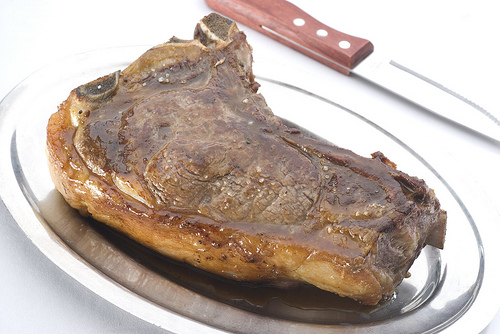
Organic Meat is Safer and Healthier For Your Family
Meat is among the healthiest of health foods. Packed with vitamins and minerals, iron and protein, fats and oils, meat is an ideal dietary choice... unless it's also packed with some other things. Modern factory farming practices are devoted to producing the maximum possible quantity of meat at the minimum possible price. That means keeping animals crammed closely together in unsanitary conditions. To prevent this causing diseases, the animals are regularly dosed with prophylactic antibiotics. They're often fed growth hormones too, to encourage them to get bigger quicker. Finally, they eat an unsavory diet rich in grains and sometimes animal products, a practice that's implicated by the spread of BSE (bovine spongiform encepholopathy) in British cattle; this was probably spread through cattle by feeding them reclaimed cattle brains in their feed. BSE is thought to cause CJD, the human equivalent, in some people who eat infected cattle. All this can be avoided by eating organic, preferably grass fed meat, which also usually has a better nutritional profile too. The best investment you can make here is the time it takes to find a good, reliable butcher - who will often be cheaper than you think, sometimes cheaper than supermarkets for...
Meat is among the healthiest of health foods. Packed with vitamins and minerals, iron and protein, fats and oils, meat is an ideal dietary choice... unless it's also packed with some other things. Modern factory farming practices are devoted to producing the maximum possible quantity of meat at the minimum possible price. That means keeping animals crammed closely together in unsanitary conditions. To prevent this causing diseases, the animals are regularly dosed with prophylactic antibiotics. They're often fed growth hormones too, to encourage them to get bigger quicker. Finally, they eat an unsavory diet rich in grains and sometimes animal products, a practice that's implicated by the spread of BSE (bovine spongiform encepholopathy) in British cattle; this was probably spread through cattle by feeding them reclaimed cattle brains in their feed. BSE is thought to cause CJD, the human equivalent, in some people who eat infected cattle. All this can be avoided by eating organic, preferably grass fed meat, which also usually has a better nutritional profile too. The best investment you can make here is the time it takes to find a good, reliable butcher - who will often be cheaper than you think, sometimes cheaper than supermarkets for a far better product.

Apples Are A Great Fruit - And They'e Even Better Organic
Apples are an excellent source of dietary fibre and are also rich in nutrients including vitamin C, a crucial antioxidant. They can improve cardiovascular function and lower bad cholesterol. But they rank high on the list of most-pesticide-sprayed crops; according to Pesticide Action Network website Whatsonmyfood.org, 88% of conventionally farmed apples have residual traces of Thiabendazole, which is suspected of being a carcinogen. While the waxy outer coating of an apple can be washed off -- it's best to use hot water and soap, to get the wax right off - pesticide residues have usually been absorbed into the skin of the apple and washing won't remove them. This is one fruit you should buy organic!
- Important notification about information and brand names used in this slideshow!
- Photo courtesy of madlyinlovewithlife by Flickr : www.flickr.com/photos/madlyinlovewithlife/6330320978/
- 'Apples,' Whatsonmyfood.org,' 2010, stored at http://whatsonmyfood.org/food.jsp?food=AP, retrieved July 18 2013
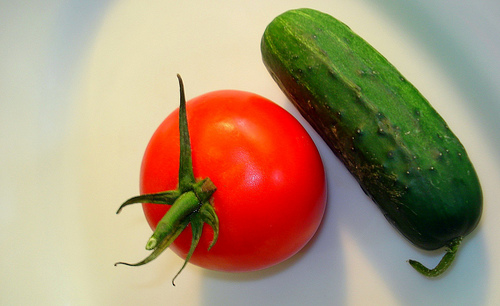
Cucumbers And Tomatoes Are Best Bought Organic
Organic tomatoes and cucumbers are safer than their non-organic counterparts because less pesticides and herbicide residues remain on the skin. But there's more. According to Dr. Oliveira and his colleagues at Cairo University, Egypt, they contain more antioxidants and vitamins than their non-organic counterparts. The principle difference is the amount of antioxidant nutrients like vitamin C in each piece of fruit, and that in turn is down to the higher levels of what's called'oxidative stress' the plants endure while growing, according to the study. Oxidative stress is a term that's applied in human health too and it means the same thing - free radicals in the body are causing oxidation reactions where they shouldn't be. What's needed to combat that is lots of antioxidants and the place to get them is organic tomatoes and cucumbers. Oh, and they taste better too.
- Important notification about information and brand names used in this slideshow!
- Photo courtesy of cbertel by Flickr : www.flickr.com/photos/cbertel/2794468320/
- Oliveira AB, Moura CFH, Gomes-Filho E, Marco CA, Urban L, et al. (2013) 'The Impact of Organic Farming on Quality of Tomatoes Is Associated to Increased Oxidative Stress during Fruit Development,' PLoS ONE 8(2): e56354. doi:10.1371

Grapes Of Wrath: Supermarket Grapes Can Contain Carcinogenic Bug Spray Leftovers
Grapes are a family favorite and they're a good way to get vitamins and fiber. They're also a good source of calcium, manganese and iron. Further, new research has indicated that there's a correlation between eating grapes or drinking grape extracts like juice (yes, or wine!) and improved blood sugar profiles and insulin regulation. Grapes also contain phytonutrients that have been linked to improved resistance to certain cancers. However, the grapes you can pick up at your local supermarket often contain traces of Captan and other known carcinogens, and are a heavily-sprayed crop with many other pesticide residues. Better to buy organic if you can.
- Important notification about information and brand names used in this slideshow!
- Photo courtesy of Philip Storry by Flickr : www.flickr.com/photos/philipstorry/339544788/

Peaches And Nectarines Can Retain Carcinogenic Pesticides
Peaches are a great source of antioxidants and fibre, and they're also delicious, especially with (organic) cream. But when they're produced by conventional farming methods they can contain residues of up to 62 chemicals that are carcinogenic or toxic. They are also a good way to pick up one of the 29 hormone disruptors found on them by the USDA Pesticide Data Program. And if you care about the long term future of the food you eat, they also have a lot of bee toxins. If you can't find organic peaches at your store, that's just one more good reason to go and find a local farmer, farmer's market or organic wholesaler and make your own arrangements, but in the meantime try a cantaloupe instead - they have a much lower pesticide load.
- Important notification about information and brand names used in this slideshow!
- Photo courtesy of Richard North by Flickr : www.flickr.com/photos/richardnorth/7380003062

Potatoes Soak Up Pesticide Residues From the Ground: Go Organic!
Potatoes are a staple of diets the world over, and they offer great nutritional benefits including high vitamin C and fiber content. However, if the leaves of the plant have been sprayed with pesticides, the tubers will absorb whatever is in the soil. That can mean known toxins like Aldicarb, Clothianidin, Methamidophos, Methyl parathion, and Propargite, as well as o-Phenylphenol residue, a known carcinogen and developmental toxicant which the United States Department of Agriculture Pesticide Data Program found in over 11% of conventionally grown potatoes. Finding a local organic supplier should allow you to buy potatoes in bulk, and they store extremely well.
- Important notification about information and brand names used in this slideshow!
- Photo courtesy of Tommy Hemmert Olesen by Flickr : www.flickr.com/photos/tommyhj/105367335/
- Organic Guide, Inc., OrganicGuide.com, 2010, stored at http://www.organicguide.com/organic/food/organic-potatoes/, retrieved July 19 2013

Kale, Spinach, Collards And Other Leafy Greens Go From Hero To Villain With Pesticides
Greens make a great addition to any meal. But varieties that have been sprayed down with pesticides dozens of times before they reach your table have their huge surface area covered with dust and sticky pesticide residues. It sometimes isn't possible to wash it all off, and avoiding pesticide load is an important way to maximize health. Dr. Walter Crinnion, writing in the Huffington Post, observed recently that kale had appeared on the list he calls the 'dirty dozen,' a record of the twelve most pesticide-heavy fruits and vegetables. Because of its light, leafy nature, kale and collard, as well as spinach, have to be protected from slugs and other vermin and the usual way to do this is with vast quantities of pesticides. Dr. Crinnion recommends that your organic food budget be used to avoid the foods with the highest pesticide load. If this is done, kale, spinach and collard can be among the healthiest foods you can buy, contributing high antioxidant and micronutrient levels to your diet.
- Important notification about information and brand names used in this slideshow!
- Photo courtesy of Greg Turner by Flickr : www.flickr.com/photos/gregturner/3168926688/
- Crinnion, Dr. Walter, 'Blueberries and Kale Placed On Most Toxic List,' Huffington Post, July 18, 2013 stored at http://www.huffingtonpost.com/dr-walter-crinnion/organic-food-blueberries_b_594624.html retrieved July 18 2013
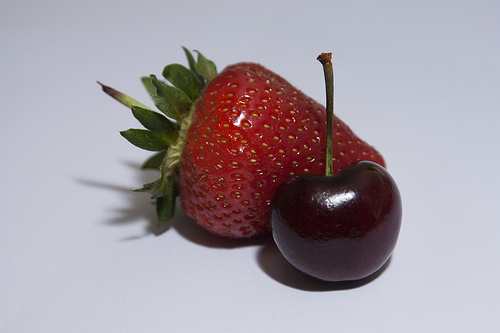
Strawberries And Cherries - The Soft Fruit Ripe For Picking Up At The Organic Store
Strawberries and cherries are soft fruits and as a result they're a prime target for pests and birds. Consequently they're sprayed massively with pesticides and are notorious for containing pesticide residues. Cherries are a good source of fibre and vitamin C, and they're also a good place to pick up some potassium, but they're one of the most pesticide loaded crops on the market when the arrive in conventional stores. Pesticides detected by the USDA Pesticide Data Program included carcinogenic compounds and neurotoxins. Again, while they can be washed, it's unlikely to remove all the chemicals that have been absorbed and the mot reliable way to go is to buy your cherries organic.
- Important notification about information and brand names used in this slideshow!
- Photo courtesy of seimansung by Flickr : www.flickr.com/photos/seimansung/7496860070/


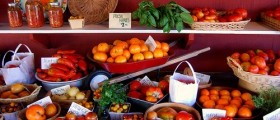
_f_280x120.jpg)

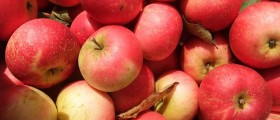


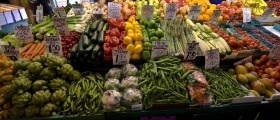
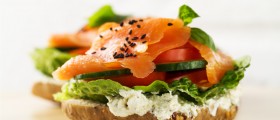





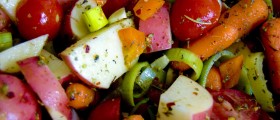
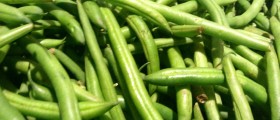
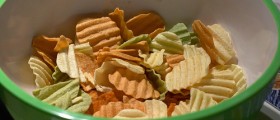
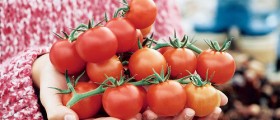




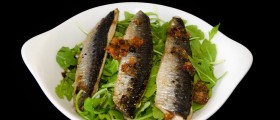
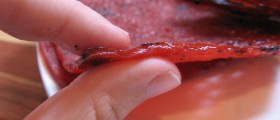


Your thoughts on this
Loading...